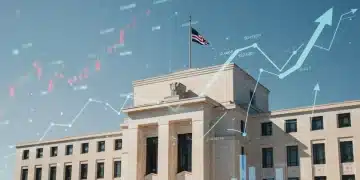Insights on interest rate predictions: what’s coming next?

Changes in interest rates directly impact your finances by affecting borrowing costs, influencing mortgage payments, and altering returns on savings, necessitating careful financial planning.
Insights on interest rate predictions are crucial for anyone looking to navigate the complex financial landscape. Have you considered how these predictions might shape your budget or investments? Let’s dive into the latest forecasts and their implications.
Understanding current interest rate trends
Understanding current interest rate trends is essential for individuals and businesses alike. The way rates fluctuate can significantly impact your financial decisions, from mortgages to savings accounts.
Key Factors Affecting Interest Rates
Several key factors influence interest rates today:
- Inflation: Higher inflation typically leads to increased interest rates as lenders need to compensate for the decreased purchasing power of money.
- Central Bank Policies: Central banks, like the Federal Reserve, adjust rates to stabilize the economy. Understanding their actions can provide insight into future trends.
- Economic Growth: Strong economic growth can lead to increased demand for loans, driving rates up.
It’s also important to monitor market sentiment. Investor confidence can play a role in rate changes, as fluctuations in stock markets often reflect broader economic health. As the demand for credit changes, so does the interest rate landscape.
Current Trends to Watch
Currently, we are observing several trends in the interest rate environment. For example, after a period of near-zero rates, many economies are gradually increasing rates to combat inflation. This shift can influence borrowing costs and savings yields.
- Rising Rates: Many analysts predict a continued increase in rates in response to the economic recovery from the recent downturn.
- Market Reactions: Financial markets are reacting to these changes, highlighting the importance of staying informed.
- Consumer Behavior: As rates rise, consumer behavior regarding loans and savings often adjusts, warranting close observation.
In summary, the landscape of interest rate trends is complex, influenced by various economic factors. Staying updated on these trends is vital for making informed financial decisions that align with your goals.
Factors influencing future interest rates

Understanding the factors influencing future interest rates is key for making sound financial decisions. Several elements contribute to rate changes, and recognizing these can help you plan ahead.
Economic Indicators
Many economic indicators play a significant role in shaping interest rates. For instance, when inflation rises, central banks often respond by increasing rates to combat it. Similarly, employment levels can provide insight into economic health.
- Inflation Rate: The general level of prices in the economy, often measured by the Consumer Price Index (CPI).
- Unemployment Rate: High unemployment can signal a weak economy, leading to lower interest rates.
- GDP Growth: Strong growth typically results in higher demand for credit and can push rates up.
In addition to these indicators, global economic conditions also impact interest rate decisions. Events such as trade agreements or geopolitical tensions can sway market sentiment and influence rates. As economies become more interconnected, changes in one region can ripple across the globe.
Central Bank Policies
The actions of central banks are vital in determining future interest rates. For example, when a central bank raises its base rate, borrowing becomes more expensive, which can slow down economic activity.
- Monetary Policy: Central banks may adopt a contractionary policy to curb inflation by raising rates.
- Open Market Operations: Buying or selling government bonds affects the money supply and can influence rates.
- Forward Guidance: Central banks communicate their future policy intentions to guide market expectations.
As we look ahead, staying informed about these factors will help in adapting your financial strategies. Understanding how economic conditions and central bank policies interact is essential for navigating future interest rate environments. By paying attention to these elements, you can make more informed decisions about loans and investments as rates fluctuate.
Expert predictions for the next year
Expert predictions for the next year regarding interest rates are vital for understanding potential economic shifts. Analysts constantly evaluate data to forecast how rates may change, helping individuals and businesses make informed decisions.
Predicted Rate Trends
This year, many analysts anticipate a gradual increase in rates. This expectation comes from various economic factors that are currently at play. As economies recover, demand for credit may rise, impacting future rates.
- Modest increases: Analysts expect rates to rise slowly as the economy stabilizes.
- Inflation control: The goal of many central banks is to keep inflation in check, prompting cautious rate hikes.
- Global influences: Changes in international markets can also impact domestic interest rates.
Furthermore, while the general trend is upward, the exact timing and extent of these increases remain uncertain. Factors like political changes and unexpected economic events can greatly influence forecasts.
Factors Considered by Experts
When economists make predictions, they consider a variety of data points. These include inflation rates, employment statistics, and consumer spending trends. Each plays a crucial role in shaping monetary policy.
- Inflation Rate: Rising inflation often leads to higher interest rates.
- Job Growth: Strong job numbers can boost spending, putting pressure on rates.
- Consumer Confidence: When consumers feel secure, they are more likely to borrow and spend.
As we observe these expert predictions, staying informed can help you plan your finances effectively. Understanding these insights can lead to better timing for loans and investments in response to changing rates. Being proactive now can position you well for the coming year.
How changes in rates affect your finances

Understanding how changes in interest rates affect your finances is essential for managing your money wisely. As rates fluctuate, they can impact various aspects of your financial life, from loans to savings.
Impact on Borrowing Costs
When interest rates rise, borrowing becomes more expensive. This can make loans, such as mortgages or car loans, costlier over time. Higher rates mean that the monthly payments increase, which can strain budgets.
- Mortgage Payments: A small increase in interest rates can lead to significantly higher monthly payments for homes.
- Credit Card Rates: Many credit cards have variable rates that adjust with prime rates, causing your balance to accrue interest faster.
- Personal Loans: If you’re considering taking out a loan, higher rates might dissuade you from borrowing.
This is why staying informed about interest rate movements is crucial. If you are planning to make a large purchase or take out a loan, timing can make a big difference.
Effects on Savings and Investments
On the other hand, rising interest rates can benefit savers. Higher rates often translate into better returns on savings accounts and fixed-income investments. This can encourage more people to save, as their money will earn more.
- Savings Accounts: Look for accounts that offer competitive interest rates, especially when rates rise.
- Bonds: New bonds will likely pay higher yields, making them more attractive to investors.
- Investment Strategies: Investors may adjust their portfolios to take advantage of higher rates, often shifting from equities to bonds.
Conversely, if interest rates rise too quickly, it might lead to a slowdown in economic growth. This can affect job security, which in turn can influence individual financial stability. Understanding this balance is critical for making informed decisions.
In summary, understanding how changes in interest rates affect your finances is essential for making informed decisions. Whether you’re borrowing money or saving, being aware of rate trends can have a significant impact on your financial health. Rising rates can increase borrowing costs, making loans more expensive, while also benefiting savers with better returns. Staying updated on these shifts helps you plan effectively for the future and navigate the financial landscape more confidently.
\n\n
\n
FAQ – Frequently Asked Questions about Interest Rate Changes
How do interest rate changes affect my mortgage?
When interest rates rise, your mortgage payments can increase, making your home loan more expensive over time.
What happens to my savings when interest rates go up?
Higher interest rates often lead to better returns on savings accounts, helping you earn more on your saved money.
Why should I monitor interest rates regularly?
Staying updated on interest rate trends allows you to make informed decisions about borrowing and saving, protecting your financial health.
Can rising interest rates impact my investment strategy?
Yes, as rates rise, investors may adjust their portfolios, often shifting from stocks to fixed-income investments for better yields.





